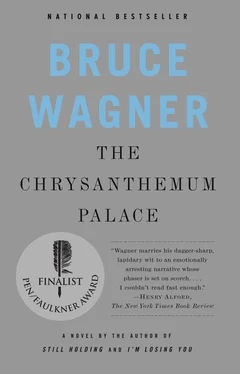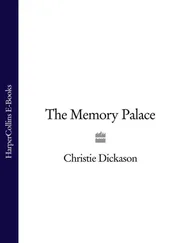“What exactly happened between you and your family?” probed the captain.
“I’d rather not discuss it, sir.”
“I’m ordering you, Ensign. By concealing your true identity, you’ve endangered a starship and her crew.”
“I’m sorry, sir,” said Thad, subtly flinching. “I never imagined they would—”
“I am not assigning blame. All the same, I expect some answers.”
“I suppose… I never belonged.” He plunged in without fanfare, delivering potential laugh lines as if abruptly from the analyst’s couch — an unvarnished, marvelous choice that made him as watchable as it did vulnerable. “As the king’s son, tremendous pressures are exerted. There are expectations. Responsibilities…”
“We all have responsibilities, yeoman,” said the captain, tough yet avuncular. “Mine is the Demeter and her crew. That’s what it means to be a grown-up.”
“You couldn’t understand,” said Thad, wandering toward a clump of lime green stalactites. A touch of Monty Clift savvily crept into the stutter of sturm und drang. “There was no privacy — to study the things I cared for. No time to be myself. ” A smile graced the captain with the realization he had engaged an exotic, overgrown adolescent. “The days and nights were empty, filled with mindless pomp and circumstance.”
“I assume there are necessary evils to growing up as you did… though I have a hard time imagining ‘pomp and circumstance’ high on that list. May not a prince be able to choose how he spends his day?” asked the captain, slipping into the manneredly aggressive mode that had become a veritable staple of Mad TV parody. “He has merely to assert, to demand— ”
“I am not my brother! He revels in the trappings of palace, the glory of his subjects. My father always said he was a throwback to olden times. Morloch is a warrior — his whole life has been a rehearsal for kingship.”
“But how, ” said the captain, with the sensual, stammering breathiness that was his hallmark, “did you come to leave a world that was your home? To give up your birthright as prince … for the corridors and engine rooms of a Legion starship?”
“I–I ran away,” said the ensign, sadly. His father’s shame was such that the royal court was forced to tell the people he had perished “while on what we call a Kuzda: a spiritual rite of passage endured by Vorbalidian males similar to the ‘vision quest’ of your American Indians.”
Suddenly, the captain had newfound admiration, impressed by the “moral ferocity” it took for the ensign to give up family and monarchal inheritance in order to live as a free man.
“That,” he said, “is true warriorship.”
“I’ve had time to think about it, sir.” Thad grew pensive, readying himself to walk the plank of one of those lowbrow-highbrow Starwatch soliloquies. “I’ve concluded it was fear that exiled me — fear that banished me from the kingdom of my life. You see, Captain, I was in love with a woman, and ran away under the cloak of ‘integrity.’ I was afraid I would abdicate and bring her disgrace. You cannot imagine what it’s like to be born a prince yet know in your heart you are not that. Rather, you are a foot soldier of mediocre stamina, little ambition, and less vision: in a word, an ensign.” Pause. “And that I have become.”
“True,” said Laughton, in full-bore Emmy throttle. (A few writers had converged just out of eye line to behold the harvesting of the fruits of their labors.) “I cannot. Nor can you imagine what it is like to awaken each morning a foolish, frightened boy who must convince himself — and his crew — that he is captain of a starship.” At “Cut!” the crew applauded both men. We broke for lunch.

I ate barbecued chicken with a cute little gaffer. Upon finishing, I noticed a production assistant loading up a tray with assorted desserts. I assumed correctly they were destined for Mr. Michelet and told the P.A. I’d bring them to the trailer myself.
As I stepped into sunlight with my clumsy burden of sweets, Clea intercepted, steering me toward makeup. They were redoing Thad for the scenes featuring his twin — Morloch was to have a slightly harder, “Brechtian” edge. They held him captive in a big barber’s chair while a rash of newfangled skinware was applied. His hair acquired extensions, some wrapped in the same aluminum foil that covered the peach cobbler and melting vanilla ice cream; he looked like something out of Ed Wood. The guest star was allowed a moment’s respite so Clea could insert a spoonful of pie into his mouth before the gals went back to the surgical task at hand. An assistant director knocked at the door: he was needed on set. Another five minutes passed while cosmetic snake charmers called forth the cobra Morloch, then ten, then fifteen, the mood typically urgent, sweaty, and airless as walkies crackled outside and the nervous messenger hovered, fearing he’d be shot for the delay. Finally, the dark prince was released. Clea and I walked him to the soundstage, preceded by the A.D. as if by royal retinue. Occasionally, a bustling carpenter or grip whistled or shouted approbation of the ensign’s charismatically toxic transformation.
Thad strolled abstracted to his off-camera mark.
Clea and I had a few minutes to catch up before shooting began. She said Miriam called with good news: Mordecai Klotcher had expressed interest in The Soft Sea Horse, and wanted to “get Thad in a room” with some hot young director. Clea delighted in adding that there was a nice response to the Children of the Famous idea when her agent floated it past a certain Showtime exec. More importantly, things had been going well with the couple since the big upset — the San Rafael excursion had worked wonders. (She thanked me again for coming.) I told her Dad wanted to throw a soirée for them at the house on Friday night, and was particularly looking forward to meeting Thad.
An A.D. shouted imperiously.
We scrambled to our positions. A makeup girl gave my boots a sheen of Fellcrum fairy dust.
The director called “Action!”
I entered frame, out of breath, followed by the android.
“A landing party, Captain,” I said. “Headed this way.”
“How many?” he asked.
“Two,” said Cabott. “A male and a female.”
A beat later, Morloch arrived accompanied by his consort, Ambassador Trothex. With glistening cobalt blue hair and tackily resplendent jewel-woven bodice (native to this far-flung quadrant), Clea looked breathtaking — and astonishingly like her mother. 1
After introducing himself, the flamboyant prince apologized for our awkward arrival, noting “how even Vorbalidian technology could not circumvent the devilish molecular tricks played by the magnetic properties of our Great Dome.” The captain didn’t buy it, going on record that our forced visit flew in the face of established Jano-Kryag Convention accords.
Morloch approached the ensign. (Actually the script supervisor. Thad would shoot the opposing part later in the week, the two images ultimately spliced together.)
“How soft you’ve gotten,” said Morloch.
“How hard you’ve remained,” said the script supervisor. “What is the state of Father’s health?”
“Your arrival will most likely finish him,” said Morloch, wonderfully witchy.
“And — Mother?”
“A shadow. A wraith. A phantom,” said the twin, gleefully chewing the blue screenery. It was fun as hell to watch.
As the scene continued I noticed Thad’s features, even beneath the shell of appliances, weirdly soften. Then, as if in a dream, he stepped languorously off his mark.
Читать дальше













